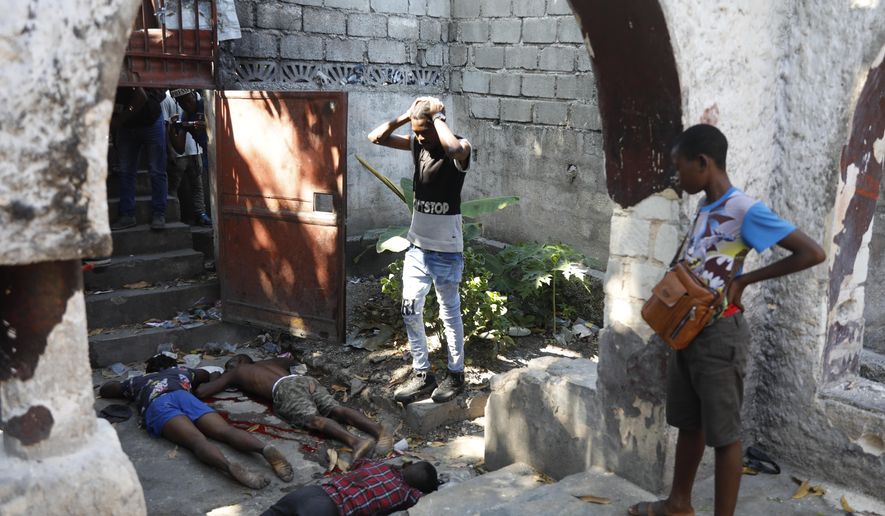OPINION:
Then-President Donald Trump may have painted with too broad a brush when, in 2018, he cavalierly described some Third World nations as “s—-hole” countries, but in singling out Haiti, he was dead on. Sophisticated observers over the years have used language more appropriate for diplomats and Harvard faculty experts, but everyone who knows the place would rather live almost anywhere else.
In the 1990s, the Clintons, along with former President Jimmy Carter, adopted Haiti and Jean-Bertrand Aristide, the populist sociopathic former Salesian priest who ran it. They led and financed a campaign to turn the dysfunctional place into a prosperous democracy in the Americas. It was perhaps a noble liberal dream, but together, they managed to do more harm than good.
Mr. Aristide seemed perfect for the role. He was popular and had fought to bring what they saw as constitutional order to a country that had seen dozens of violent coups, misgovernment, and more corruption than most since its founding. Mr. Aristide talked democracy and even spoke favorably of U.S. suggestions that freeing up the Haitian economy might improve conditions in one of the world’s poorest nations.
As mesmerized as Bill Clinton and Mr. Carter, more than 90% of Haiti’s voters turned out to elect the priest they saw as the leader who would save them from having to live in the sort of place Mr. Trump would so graphically describe two decades later.
Once elected, Mr. Aristide purged his party of men and women who believed him earlier and jailed opponents. He began living like a king, aiding those stealing reconstruction and humanitarian money flowing into Haiti thanks to the efforts of those like the Clintons. He was not a democrat, a humanitarian, or a man of his word, but exactly the sort of populist tyrant that has destroyed hope in nations like Haiti for generations.
In the process, he destroyed the little faith the Haitian people had in politicians. By the next election, only about 10% voted. Mr. Aristide was driven into exile eventually, but his friend Mr. Clinton sent 20,000 U.S. troops and spent more than $3 billion to put him back in power.
Mr. Aristide immediately resumed persecuting his detractors and systematically destroying what was left of the democratic system he had vowed to honor. Mr. Carter denounced the next elections he set up as a sham, but Mr. Clinton continued his support.
Columnist Bob Novak was appalled at what Mr. Aristide was up to with the active connivance of Democrats in Washington. He asked me if I would travel to Haiti in early 2001 to meet with Mr. Aristide‘s critics, who had come together as “the Democratic Convergence” to oppose the mad priest and his supporters.
Before agreeing to Novak’s proposition, I spent some time being tutored by American Haitian “experts.” Walter Fauntroy, the District of Columbia’s former nonvoting congressional delegate, had been chair of the Congressional Haiti Caucus and had been instrumental in persuading “Baby Doc” to turn the government over to his opponents and flee the country. In one briefing, I suggested to Mr. Fauntroy that he might want to accompany me on my visit, but Mr. Fauntroy demurred.
“I can’t. Aristide has a contract out on me,” he said. I went without him and soon found myself at a lunch in Port-au-Prince with a diverse group of Aristide haters. The Duvalier family controlled the party that ran Haiti until “Baby Doc” Duvalier was forced into exile by many who had put their faith in Mr. Aristide. The chairman of that party sat on my right. The Haitian Communist Party chairman sat on my left. The heads of perhaps a dozen other Haitian parties united only by their opposition to Mr. Aristide completed the table.
Mr. Aristide was eventually driven from power a second time, but as bad as things were, they are infinitely worse today. Whatever was left of a working internal infrastructure was all but wiped out by a massive earthquake and storm in 2010. Since then, the country has been beset by violent gangs and drug distributors the government cannot control.
Early this spring, the gangs in Port-au-Prince forced the government to resign. Civilians are butchered on the streets by rival gangs, the most powerful headed by Jimmy “Barbecue” Cherizier, a thug blamed for a 1988 gang offensive that killed more than 70 civilians and burned hundreds of homes.
Last week, international relief organizations warned that the 11 million people trapped there are facing famine, disease, and continuing violence. Donald Trump may have been wrong about many things, but he nailed Haiti.
• David Keene is editor-at-large at The Washington Times.




Please read our comment policy before commenting.